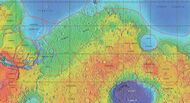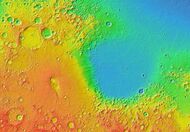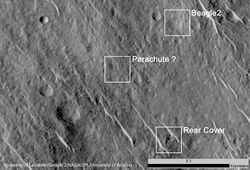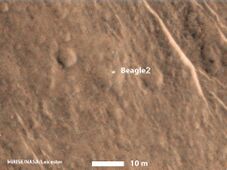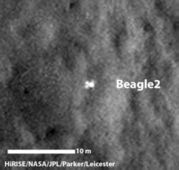Astronomy:Isidis Planitia
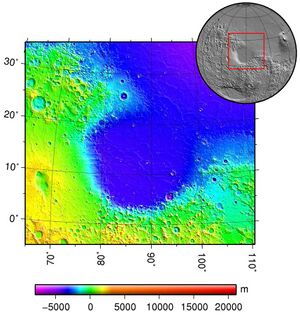 Topography of Isidis Planitia | |
| Location | North of Hellas Planitia, east of Syrtis Major Planum, Mars |
|---|---|
| Coordinates | [ ⚑ ] : 12°54′N 87°00′E / 12.9°N 87.0°E |
| Diameter | 1,900 km (1,200 mi)[1] |
| Eponym | Isis is the Egyptian goddess of heaven and fertility. |
Isidis Planitia is a plain located within a giant impact basin on Mars, located partly in the Syrtis Major quadrangle and partly in the Amenthes quadrangle. At approximately 1,900 km (1,200 mi) in diameter,[1] it is the third-largest confirmed impact structure on the planet, after the Hellas and Utopia basins. Isidis was likely the last major basin to be formed on Mars, having formed approximately 3.9 billion years ago during the Noachian period,[2] by an impactor around 200 kilometres (120 mi) in diameter.[3] Due to dust coverage, it typically appears bright in telescopic views, and was mapped as a classical albedo feature, Isidis Regio, visible by telescope in the pre-spacecraft era.
A study reported in Icarus described the complex geologic history of parts of Isidis, especially areas near the Deuteronilus contact. This contact is the supposed edge of a vast Martian ocean. The researchers found evidence of a Late Hesperian/Early Amazonian Sea in the area. The sea would have quickly frozen over. Eskers formed under the ice.[4]
Just to the west of Isidis is Syrtis Major Planum, a low-relief shield volcano that is a prominent dark albedo feature of Mars, which formed after the basin.[5] The westernmost extent is bounded by a subregion, Northeast Syrtis with diverse geology. Around the Isidis basin magnesium carbonate was found by the Mars Reconnaissance Orbiter. This mineral indicates that water was present and that it was not acidic, pH conditions more favorable for the evolution of life.[6]
The name Isidis Planitia follows the earlier name Isidis Regio ('region of Isis'). Isis is the Egyptian goddess of heaven and fertility.
Gallery
-
MOLA map showing boundaries of Isidis Planitia and other regions
-
MOLA colorized topographic map showing Isidis Planitia (right) and the adjacent low-relief shield volcano Syrtis Major Planum (left).
Beagle 2
The Beagle 2 lander was about to land in the eastern part of Isidis Planitia in December 2003, when contact with the craft was lost. In January 2015, NASA reported the Beagle 2 had been found on the surface in Isidis Planitia (location is about [ ⚑ ] 11°31′35″N 90°25′46″E / 11.5265°N 90.4295°E).[7][8] High-resolution images captured by the Mars Reconnaissance Orbiter identified the lost probe, which appears to be intact.[9][10][11] (see discovery images here)
Mars 2020 mission
In 2018 the Jezero (crater) in the north west rim of the Isidis basin was selected as a landing site for the Mars 2020 mission, including the Perseverance rover.
See also
- Geography of Mars
- Geological history of Mars
- Hesperian
- List of plains on Mars
- Mars ocean theory
References
- ↑ 1.0 1.1 Tornabene, Livio L.Expression error: Unrecognized word "et". (October 2008). "Surface and crater-exposed lithologic units of the Isidis Basin as mapped by coanalysis of THEMIS and TES derived data products". Journal of Geophysical Research 113 (E10). doi:10.1029/2007JE002988. Bibcode: 2008JGRE..11310001T.
- ↑ Ritzer, J.; Hauck, S. (June 2009), "Lithospheric structure and tectonics at Isidis Planitia, Mars", Icarus 201 (2): 528–539, doi:10.1016/j.icarus.2009.01.025, Bibcode: 2009Icar..201..528R
- ↑ Branco, Hely C.; Miljkovic, Katarina; Plesa, Ana‐Catalina (April 2024). "New Numerically Derived Scaling Relationships for Impact Basins on Mars" (in en). Journal of Geophysical Research: Planets 129 (4). doi:10.1029/2023JE008217. ISSN 2169-9097. https://agupubs.onlinelibrary.wiley.com/doi/10.1029/2023JE008217.
- ↑ Erkeling, G.; Reiss, D.; Hiesinger, H.; Ivanov, M.A.; Hauber, E.; Bernhardt, H. (November 2014). "Landscape formation at the Deuteronilus contact in southern Isidis Planitia, Mars: Implications for an Isidis Sea?". Icarus 242: 329–351. doi:10.1016/j.icarus.2014.08.015. Bibcode: 2014Icar..242..329E. https://elib.dlr.de/91942/1/Erkeling_et_al.Isidis_Contact.LPSC_2014.pdf.
- ↑ Hiesinger, H.; Head, J. W. (2004-01-08), "The Syrtis Major volcanic province, Mars: Synthesis from Mars Global Surveyor data", Journal of Geophysical Research: Planets 109 (E1): E01004, doi:10.1029/2003JE002143, E01004, Bibcode: 2004JGRE..109.1004H
- ↑ Murchie, S. L.; Mustard, J. F.; Ehlmann, B. L.; Milliken, R. E.; Bishop, J. L.; McKeown, N. K.; Noe Dobrea, E. Z.; Seelos, F. P. et al. (February 2009). "A synthesis of Martian aqueous mineralogy after 1 Mars year of observations from the Mars Reconnaissance Orbiter". Journal of Geophysical Research: Planets 114 (E2): E00D06. doi:10.1029/2009JE003342. ISSN 0148-0227. Bibcode: 2009JGRE..114.0D06M. https://authors.library.caltech.edu/43957/1/jgre2648.pdf.
- ↑ Ellison, Doug (16 January 2015). "re Beagle 2 location on Mars => "Using HiView on image ESP_039308_1915_COLOR.JP2 I get 90.4295E 11.5265N"". Twitter & JPL. https://twitter.com/doug_ellison/status/556201983443357696.
- ↑ Grecicius, Tony; Dunbar, Brian (16 January 2015). "Components of Beagle 2 Flight System on Mars". NASA. http://www.nasa.gov/jpl/mars/pia19106/.
- ↑ 9.0 9.1 Webster, Guy (16 January 2015). "'Lost' 2003 Mars Lander Found by Mars Reconnaissance Orbiter". NASA. http://www.nasa.gov/jpl/lost-2003-mars-lander-found-by-mars-reconnaissance-orbiter/.
- ↑ "Mars Orbiter Spots Beagle 2, European Lander Missing Since 2003". New York Times. Associated Press. 16 January 2015. https://www.nytimes.com/2015/01/17/science/space/missing-lander-beagle-2-finally-located-on-mars.html.
- ↑ Amos, Jonathan (16 January 2015). "Lost Beagle2 probe found 'intact' on Mars". BBC. https://www.bbc.co.uk/news/science-environment-30784886.
External links
 |
